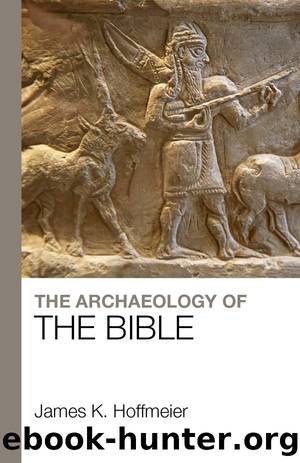Archaeology of the Bible (9781912552214) by Hoffmeier James K

Author:Hoffmeier, James K.
Language: eng
Format: epub
Publisher: Independent Pub Group
CHAPTER 8
THE TALE OF TWO KINGDOMS: ISRAEL AND JUDAH
A House Divided Against Itself
Solomonâs lavish building projects in Jerusalem and the defence network he built to protect his kingdom were made possible through a system of forced labour into which people were conscripted for periods of service (1 Kings 9:15). But this harsh treatment led to opposition to Solomonâs policies and internal strife that eventually brought schism within the kingdom. Jeroboam, an able official of Solomon, was responsible for recruiting the workers from the tribes of Ephraim and Manasseh (1 Kings 11:28). He began to oppose the kingâs policy to the point that he became a wanted man. To avoid Solomonâs death sentence on him, Jeroboam fled to Egypt where Pharaoh Shishak gave him sanctuary (1 Kings 11:40). One might ask why Egypt, Solomonâs ally, would give aid and comfort to his political enemy. In the years since the alliance was made between Solomon and Pharaoh â probably Siamun of Tanis â the Twenty-first Dynasty had ended, and a Libyan usurper had assumed the kingship of the north. From Egyptian sources, this king is known to have been Shoshank, the first of five rulers to bear that name. Shishak is the Hebrew form of this Libyan name. He became king around 945 BC, during the second half of Solomonâs reign. The new king and dynasty meant that the old treaty with Solomon was over, abandoned when Psusennes II, the last monarch of the Twenty-first Dynasty, died.
In Solomonâs final years, several of the outlying parts of the kingdom began to rebel against Israel (1 Kings 11:14â25). So there were internal pressures from separatist forces such as those of Jeroboam, and external stress on the kingdom from vassal states such as Edom and Zobah. Rehoboam succeeded his father around 931 BC, opening the way for Jeroboam to return from Egypt and be the spokesman for the northern tribes, who asked the new king to reduce their forced labour burden (1 Kings 12:1â11). Following Rehoboamâs rejection of their appeal, the representatives of the ten northern tribes spurned Rehoboam and made Jeroboam their new king (1 Kings. 12:6â20). The northern kingdom was known as Israel, while Judah in the south was ruled by the successors of David, and was sometimes called the âHouse of Davidâ. Thus what had been a united nation became two independent and, for the most part, adversarial kingdoms. The border dividing the rival kingdoms was situated just north of Jerusalem, although many battles were fought during the first fifty years of the divided kingdom to determine the precise location of the boundary lines.
Download
This site does not store any files on its server. We only index and link to content provided by other sites. Please contact the content providers to delete copyright contents if any and email us, we'll remove relevant links or contents immediately.
| Anthropology | Archaeology |
| Philosophy | Politics & Government |
| Social Sciences | Sociology |
| Women's Studies |
Mysteries by Colin Wilson(2883)
People of the Earth: An Introduction to World Prehistory by Dr. Brian Fagan & Nadia Durrani(2345)
Ancient Worlds by Michael Scott(2098)
Foreign Devils on the Silk Road: The Search for the Lost Treasures of Central Asia by Peter Hopkirk(2052)
The Memory Code by Lynne Kelly(1937)
Lost Technologies of Ancient Egypt by Christopher Dunn(1796)
The Splendid and the Vile by Erik Larson(1780)
Come, Tell Me How You Live by Mallowan Agatha Christie(1764)
The Earth Chronicles Handbook by Zecharia Sitchin(1742)
The Plantagenets by Dan Jones(1611)
Last Chance to See by Douglas Adams(1595)
The Return of the Gods by Erich von Daniken(1570)
Wars of the Anunnaki by Chris H. Hardy(1390)
Before the Dawn by Nicholas Wade(1313)
Keeper of Genesis by Graham Hancock(1277)
The Cygnus Mystery by Andrew Collins(1257)
The Message of the Sphinx by Graham Hancock(1221)
Fragile Lives by Stephen Westaby(1112)
Hieroglyphs: A Very Short Introduction by Penelope Wilson(1032)
